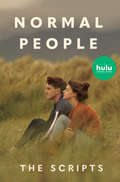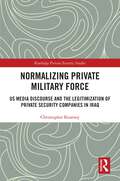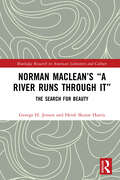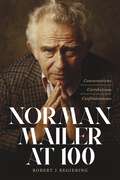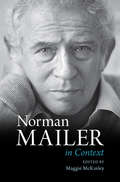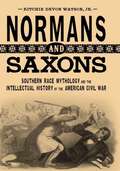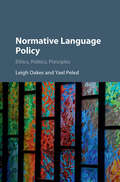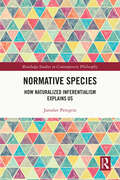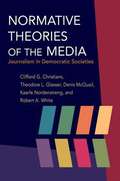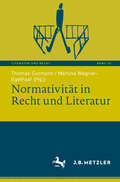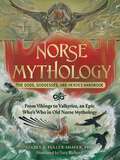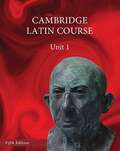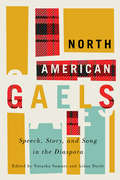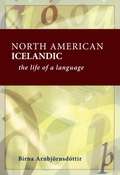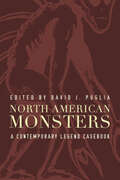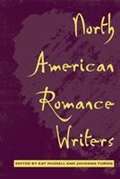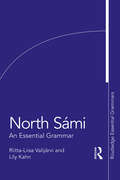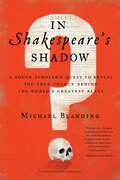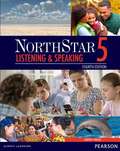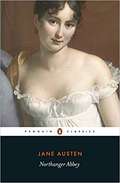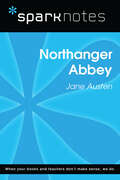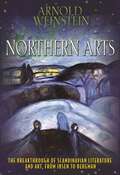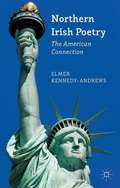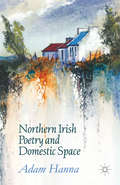- Table View
- List View
Normal People: The Scripts
by Sally RooneyDelve deeper into the Emmy- and Golden Globe–nominated Hulu series based on Sally Rooney's bestselling novel with this must-have collection of the Normal People scripts, featuring behind-the-scenes photos and an introduction by director Lenny Abrahamson.&“You know, I did used to think that I could read your mind at times.&”&“In bed you mean.&”&“Yeah. And afterwards but I dunno maybe that's normal.&”&“It&’s not.&”Connell and Marianne grow up in the same small town in the west of Ireland, but the similarities end there. In school, Connell is popular. Marianne is a loner. But when the two strike up a conversation, something life-changing begins.With an introduction by director Lenny Abrahamson and featuring iconic images from the show, Normal People: The Scripts contains the complete screenplays of the acclaimed Emmy- and Golden Globe–nominated television drama that The New York Times called &“an unusually thoughtful and moving depiction of young people&’s emotional lives.&”
Normalising Private Military Force: US Media Discourse and the Legitimization of Private Security Companies in Iraq (Routledge Private Security Studies)
by Christopher KearneyThis book examines the normalization of Private Military and Security Companies (PMSCs), and analyses US media discourse around the Nisour Square incident in Iraq as a pivotal case.States are increasingly relying on PMSCs to meet security needs. As a sign of ongoing normalization, these companies are now increasingly targeted by soft law or self-regulation. Rejecting the common claim that ‘mercenaries have always been with us’, this book sets out to analyse the underlying conditions that have allowed PMSCs to emerge in their uniquely contemporary incarnation. Divided into two parts, this book develops a novel poststructural framework of analy-sis to articulate social, political, and affective conditions that enabled PMSCs to prevail despite controversy. It draws on and operationalizes the Essex School’s logics-based approach, while developing it further with corpus linguistics, and ap-plies this framework to a large corpus of American mainstream media articles. The volume contributes to efforts aiming to overcome the alleged ‘methodological deficit’ of discourse analysis, while highlighting the importance of making uncon-sciously held truths visible.This book will be of interest to students of private security companies, military studies, critical security studies, and International Relations.
Norman Maclean’s “A River Runs through It”: The Search for Beauty (Routledge Research in American Literature and Culture)
by George H. Jensen Heidi Skurat HarrisNorman Maclean’s “A River Runs through It”: The Search for Beauty is the first book-length study of Norman Maclean or any of his works. Since the publication of “A River Runs through It” in 1976, readers and critics have considered it to be one of the most carefully crafted stories in American literature, in terms of both its structure and its style. The beauty of the story came with much hard work. This study traces Maclean’s revisions through four handwritten drafts and three typescripts, quoting extensively from previously unpublished material. The analysis of Maclean’s composition process lays the foundation for original and detailed discussions of other aspects of Maclean’s craft, such as his approach to genre and style. The study publishes for the first time the complete text of the notes that Maclean wrote after the first draft of “A River Runs through It.”
Norman Mailer at 100: Conversations, Correlations, Confrontations
by Robert J. BegiebingNorman Mailer at 100 celebrates the author’s centenary in 2023 and the seventy-fifth anniversary of the publication of his bestselling debut novel, The Naked and the Dead, by illustrating how Mailer remains a provocative presence in American letters. Novelist and Mailer scholar Robert J. Begiebing lays out how this polymath author’s work makes vital contributions to the larger American literary landscape, encompassing the debates of the nation’s founders, the traditions of Western Romanticism, and the juggernaut of twentieth-century modernism. The book includes six critical essays, two creative dialogues featuring Walt Whitman and Ernest Hemingway, and Begiebing’s own interview with Mailer from 1983. Each piece pairs Mailer with a critical interlocutor whose work offers telling revelations about his ideas and art, among them Ralph Waldo Emerson, Carl Jung, Kate Millett, and Joan Didion. By encouraging a reconsideration of his career from its beginnings to his final books in the early twenty-first century, Norman Mailer at 100 forges a new path toward appreciating the author’s achievements that underscores the extent to which his work can help us confront the challenges of today.
Norman Mailer in Context (Literature in Context)
by Maggie McKinleyThis volume offers new insight into the breadth of contexts that inform Norman Mailer's body of work. It examines important literary, critical, theoretical, cultural, and historical frameworks for Mailer's writing, highlighting the ways his work reflects the concerns of twentieth and twenty-first century America. This book traces Mailer's literary influences; his contributions to a variety of literary genres; his participation in the American political sphere; the philosophical, religious, and gendered contexts that shape his work; and the iconic American figures he profiled. The book concludes with reflections on Mailer's literary and cultural legacy, emphasizing his advocacy for literary freedom and the contemporary resonance of his work.
Normans and Saxons: Southern Race Mythology and the Intellectual History of the American Civil War (Southern Literary Studies)
by Ritchie Devon Jr.When Representative Preston Brooks of South Carolina savagely caned Senator Charles Sumner Massachusetts on the floor of the U.S. Senate on May 21, 1856, southerners viewed the attack as a triumphant affirmation of southern chivalry, northerners as a confirmation of southern barbarity. Public opinion was similarly divided nearly three-and-a-half years later after abolitionist John Brown's raid on the Federal arsenal at Harper's Ferry, Virginia, with northerners crowning John Brown as a martyr to the cause of freedom as southerners excoriated him as a consciousness fanatic. These events opened American minds to the possibility that North and South might be incompatible societies, but some of Dixie's defenders were willing to go one step further -- to propose that northerners and southerners represented not just a "divided people" but two scientifically distinct races. In Normans and Saxons, Ritchie Watson, Jr., explores the complex racial mythology created by the upper classes of the antebellum South in the wake of these divisive events to justify secession and, eventually, the Civil War. This mythology cast southerners as descendants of the Normans of eleventh-century England and thus also of the Cavaliers of the seventeenth century, some of whom had come to the New World and populated the southern colonies. These Normans were opposed, in mythic terms, by Saxons -- Englishmen of German descent -- some of whose descendants made up the Puritans who settled New England and later fanned out to populate the rest of the North. The myth drew on nineteenth-century science and other sources to portray these as two separate, warring "races," the aristocratic and dashing Normans versus the common and venal Saxons. According to Watson, southern polemical writers employed this racial mythology as a justification of slavery, countering the northern argument that the South's peculiar institution had combined with its Norman racial composition to produce an arrogant and brutal land of oligarchs with a second-rate culture. Watson finds evidence for this argument in both prose and poetry, from the literary influence of Sir Walter Scott, De Bow's Review, and other antebellum southern magazines, to fiction by George Tucker, John Pendleton Kennedy, and William Alexander Caruthers and northern and southern poetry during the Civil War, especially in the works of Walt Whitman. Watson also traces the continuing impact of the Norman versus Saxon myth in "Lost Cause" thought and how the myth has affected ideas about southern sectionalism of today.Normans and Saxons provides a thorough analysis of the ways in which myth ultimately helped to convince Americans that regional differences over the issue of slavery were manifestations of deeper and more profound differences in racial temperament -- differences that made civil war inevitable.
Normative Language Policy: Ethics, Politics, Principles
by Leigh Oakes Yael PeledLanguage politics in the new global era presents policymakers with significant ethical challenges. How should the reality of English as a global language influence the normative considerations underpinning national language policies? What moral arguments justify the imposition of national languages in an era of increased immigration and ethnolinguistic diversity? What role is there for non-dominant varieties in a globalised world? Building on the emerging notion of 'normative language policy', this book proposes an integrated framework for the study of such questions, combining recent normative work on language in political theory and philosophy with empirically-derived insight from the fields of sociolinguistics and applied linguistics. The case of Quebec forms the backdrop of the study, providing a particularly illuminating setting for investigating the common moral challenges that face contemporary polities seeking to maintain distinct linguistic identities, in an irreducibly diverse world increasingly dominated by English as a global lingua franca.
Normative Species: How Naturalized Inferentialism Explains Us (Routledge Studies in Contemporary Philosophy)
by Jaroslav PeregrinThis book is about rules, and especially about human capability to create, maintain and follow rules, as a root of what makes us humans different from other animals. The leading idea is that scrutinizing this capability is able to tell us who we humans are and what kinds of lives we live. It elaborates Wilfrid Sellars' visionary observation that "to say that man is a rational animal, is to say that man is a creature not of habits, but of rules"; and it builds on the ideas of Sellars' and Brandom's inferentialism, in a novel naturalistic way. The main tenet of inferentialism is that our language games are essentially rule-governed and that meanings are inferential roles. Jaroslav Peregrin sees the task of reconciliation of inferentialism and naturalism as centered around the problem of naturalization of rules. He argues that the most primitive form of a rule is a cluster of normative attitudes. We humans are specific by our tendency assume peculiar attitudes to what we do, and to do so in a specific way, which turns the attitudes into "normative" ones. This self-reflective structure characterizes our ability to build systems of interconnected rules, which have come to constitute our natural niche. Furthermore, Peregrin shows how our most important system of rules—that constitutive of our language—helped to lead us to our current position of rule-following, ultra-social, rational, and discursive creatures. Normative Species will be of interest to scholars and advanced students working in philosophy of language, philosophy of mind, social ontology, cultural evolution, and cognitive science.
Normative Theories of the Media: Journalism in Democratic Societies
by Denis Mcquail Robert A. White Kaarle Nordenstreng Clifford G Christians Theodore GlasserIn this book, five leading scholars of media and communication take on the difficult but important task of explicating the role of journalism in democratic societies. Using Fred S. Siebert, Theodore Peterson, and Wilbur Schramm's classic Four Theories of the Press as their point of departure, the authors explore the philosophical underpinnings and the political realities that inform a normative approach to questions about the relationship between journalism and democracy, investigating not just what journalism is but what it ought to be. The authors identify four distinct yet overlapping roles for the media: the monitorial role of a vigilant informer collecting and publishing information of potential interest to the public; the facilitative role that not only reports on but also seeks to support and strengthen civil society; the radical role that challenges authority and voices support for reform; and the collaborative role that creates partnerships between journalists and centers of power in society, notably the state, to advance mutually acceptable interests. Demonstrating the value of a reconsideration of media roles, Normative Theories of the Media provides a sturdy foundation for subsequent discussions of the changing media landscape and what it portends for democratic ideals.
Normativität in Recht und Literatur (Literatur und Recht #10)
by Thomas Gutmann Martina Wagner-EgelhaafDie Normativität des Rechts wird niemand bestreiten – inwiefern das Literatursystem normativ ist, ist dagegen offen, obgleich die Poetik ‚Gesetze&‘ kennt, die Gattungstheorie normativ argumentiert und die Literaturkritik nach bestimmten Kriterien urteilt. Dieser Band vergleicht Normativitäten von Recht und Literatur, fragt nach Spiegelungen, Gemeinsamkeiten und Unterschieden. Neben systematischen Differenzierungen im Feld normativer Begriffe werden Quellen von Normativität sowie Formen von Autorisierung diskutiert und nicht zuletzt die Möglichkeiten der Durchsetzung von Normen sowie Ressourcen, die Einzelne der Kraft der Normierung entgegenzusetzen vermögen.
Norse Mythology: From Vikings to Valkyries, an Epic Who's Who in Old Norse Mythology
by Kelsey A. Fuller-ShaferDiscover the gods, goddesses, and heroes from Norse mythology with this beautiful handbook that captures the ancient stories that captivated the Vikings.Learn more about your favorite Norse gods, goddesses, and heroes with this collection of profiles that share the real stories behind the characters. With characters from Norse myths coming to life on the big and small screens, and in the pages of new and exciting fiction, this guide can give you all the details you need to understand your favorite heroes, villains, and powerful deities. With comprehensive entries that outline each character&’s names, roles, related symbols, and foundational myths, you can get to know the roots of these personas, and better understand the new stories we tell about them today.
North American Cambridge Latin Course Unit 1 Student's Book
by Cambridge School Classics ProjectDeveloped by the University of Cambridge School Classics Project, this bestselling Latin program provides an enjoyable and carefully paced introduction to the Latin language, complemented by background information on Roman culture and civilization. The story begins in the town of Pompeii shortly before the eruption of Vesuvius in AD 79 and follows the fortunes of the household of Lucius Caecilius Iucundus. Further titles in the Course take the reader to the Roman provinces of Britain and Egypt, and to imperial Rome itself.
North American Gaels: Speech, Story, and Song in the Diaspora (McGill-Queen's Studies in Ethnic History #2.49)
by Natasha Sumner and Aidan DoyleA mere 150 years ago Scottish Gaelic was the third most widely spoken language in Canada, and Irish was spoken by hundreds of thousands of people in the United States. A new awareness of the large North American Gaelic diaspora, long overlooked by historians, folklorists, and literary scholars, has emerged in recent decades. North American Gaels, representing the first tandem exploration of these related migrant ethnic groups, examines the myriad ways Gaelic-speaking immigrants from marginalized societies have negotiated cultural spaces for themselves in their new homeland. In the macaronic verses of a Newfoundland fisherman, the pointed addresses of an Ontario essayist, the compositions of a Montana miner, and lively exchanges in newspapers from Cape Breton to Boston to New York, these groups proclaim their presence in vibrant traditional modes fluently adapted to suit North American climes. Through careful investigations of this diasporic Gaelic narrative and its context, from the mid-eighteenth century to the twenty-first, the book treats such overarching themes as the sociolinguistics of minority languages, connection with one's former home, and the tension between the desire for modernity and the enduring influence of tradition. Staking a claim for Gaelic studies on this continent, North American Gaels shines new light on the ways Irish and Scottish Gaels have left an enduring mark through speech, story, and song.
North American Icelandic: The Life of a Language
by Birna ArnbjornsdottirNorth American Icelandic evolved mainly in Icelandic settlements in Manitoba and North Dakota and is the only version of Icelandic that is not spoken in Iceland. But North American Icelandic is a dying language with few left who speak it.North American Icelandic is the only book about the nature and development of this variety of Icelandic. It details the social and linguistic constraints of one specific feature of North American Icelandic phonology undergoing change, namely Flámæli, which is the merger of two sets of front vowels. Although Flámæli was once a part of traditional Icelandic, it was considered too confusing and was systematically eradicated from the language. But in North America, Flámæli use spread unchecked, allowing the rare opportunity of viewing the evolution of a dialect from its birth to its impending demise.
North American Monsters: A Contemporary Legend Casebook (Contemporary Legend Casebook Series)
by David J. PugliaMining a mountain of folklore publications, North American Monsters unearths decades of notable monster research. Nineteen folkloristic case studies from the last half-century examine legendary monsters in their native habitats, focusing on ostensibly living creatures bound to specific geographic locales. A diverse cast of scholars contemplate these alluring creatures, feared and beloved by the communities that host them—the Jersey Devil gliding over the Pine Barrens, Lieby wriggling through Lake Lieberman, Char-Man stalking the Ojai Valley, and many, many more. Embracing local stories, beliefs, and traditions while neither promoting nor debunking, North American Monsters aspires to revive scholarly interest in local legendary monsters and creatures and to encourage folkloristic monster legend sleuthing.
North American Romance Writers
by Kay Mussell Johanna TuñónIn this work, Kay Mussell and Johanna Tuñón collect essays by contemporary North American romance authors who have come to prominence, directly or indirectly, as a result of the huge change in the field of romance writing which started in the early 1980s. New publishing houses began to compete with Harlequin, and the North American romance novel came into its own as a genre. In their essays on their own work, each of the writers in this volume describes her own "take" on the romance novel today and how she has adapted the form to accommodate her own voice and concerns. Collectively, these writers have used the romance genre to address a broad range of social issues and problems. Presenting these essays together provides a window into the creativity and originality of some of the best writers in the field.
North Carolina End-Of-Grade Coach Reading Grade 8
by Jeff PittmanNorth Carolina End-of-Grade Coach, Reading, Grade 8
North Sámi: An Essential Grammar (Routledge Essential Grammars)
by Lily Kahn Riitta-Liisa ValijärviNorth Sámi: An Essential Grammar is the most up-to-date work on North Sámi grammar to be published in English. The book provides: a clear and comprehensive overview of modern Sámi grammar including examples drawn from authentic texts of various genres. a systematic order of topics beginning with the alphabet and phonology, continuing with nominal and verbal morphology and syntax, and concluding with more advanced topics such as discourse particles, complex sentences, and word formation. full explanations of the grammatical terminology for the benefit of readers without a background in linguistics. ? Suitable for linguists, as well as independent and classroom-based students, North Sámi: An Essential Grammar is an accessible but thorough introduction to the essential morphology and syntax of modern North Sámi, the largest of the Sámi languages.
North by Shakespeare: A Rogue Scholar's Quest for the Truth Behind the Bard's Work
by Michael BlandingThe true story of a self-taught Shakespeare sleuth&’s quest to prove his eye-opening theory about the source of the world&’s most famous plays, taking readers inside the vibrant era of Elizabethan England as well as the contemporary scene of Shakespeare scholars and obsessives.Acclaimed author of The Map Thief, Michael Blanding presents the twinning narratives of renegade scholar Dennis McCarthy, called &“the Steve Jobs of the Shakespeare community,&” and Sir Thomas North, an Elizabethan courtier whom McCarthy believes to be the undiscovered source for Shakespeare&’s plays. For the last fifteen years, McCarthy has obsessively pursued the true origins of Shakespeare&’s works. Using plagiarism software, he has found direct links between Hamlet, Macbeth, Romeo and Juliet, and other plays and North&’s published and unpublished writings—as well as Shakespearean plotlines seemingly lifted straight from North&’s colorful life.Unlike those who believe someone else secretly wrote Shakespeare, McCarthy&’s wholly original conclusion is this: Shakespeare wrote the plays, but he adapted them from source plays written by North decades before. Many of them, he believes, were penned on behalf of North&’s patron Robert Dudley, in his efforts to woo Queen Elizabeth. That bold theory addresses many lingering mysteries about the Bard with compelling new evidence, including a newly discovered journal of North&’s travels through France and Italy, filled with locations and details appearing in Shakespeare&’s plays.North by Shakespeare alternates between the enigmatic life of Thomas North, the intrigues of the Tudor court, the rivalries of English Renaissance theater, and academic outsider Dennis McCarthy&’s attempts to air his provocative ideas in the clubby world of Shakespearean scholarship. Through it all, Blanding employs his keen journalistic eye to craft a captivating drama, upending our understanding of the beloved playwright and his &“singular genius.&”
NorthStar 5: Listening & Speaking Fourth Edition
by Sherry PreissNorthStar, Fourth Edition, a five-level series, engages students through authentic and compelling content and empowers them to achieve their academic and personal goals. The approach to critical thinking in both the Reading/Writing and Listening/Speaking strands challenges students to move beyond basic comprehension to higher-level analysis.
Northanger Abbey (Penguin Classics)
by Jane Austen Marilyn ButlerDuring an eventful season at Bath, young, naïve Catherine Morland experiences the joys of fashionable society for the first time. She is delighted with her new acquaintances: flirtatious Isabella, who shares Catherine's love of Gothic romance and horror, and sophisticated Henry and Eleanor Tilney, who invite her to their father's mysterious house, Northanger Abbey. There, her imagination influenced by novels of sensation and intrigue, Catherine imagines terrible crimes committed by General Tilney. With its broad comedy and irrepressible heroine, this is the most youthful and and optimistic of Jane Austen's works.
Northanger Abbey (SparkNotes Literature Guide Series)
by SparkNotesNorthanger Abbey (SparkNotes Literature Guide) by Jane Austen Making the reading experience fun! Created by Harvard students for students everywhere, SparkNotes is a new breed of study guide: smarter, better, faster. Geared to what today's students need to know, SparkNotes provides: *Chapter-by-chapter analysis *Explanations of key themes, motifs, and symbols *A review quiz and essay topicsLively and accessible, these guides are perfect for late-night studying and writing papers
Northern Arts: The Breakthrough of Scandinavian Literature and Art, from Ibsen to Bergman
by Arnold WeinsteinNorthern Arts is a magnificent and provocative exploration of Scandinavian literature and art. With intellectual power and deep emotional insights, writer and critic Arnold Weinstein guides us through the most startling works created by the writers and artists of Scandinavia over the past two centuries. Here readers will gain new perspectives on canonical giants such as Søren Kierkegaard, Henrik Ibsen, August Strindberg, Edvard Munch, Knut Hamsun, and Ingmar Bergman. Readers will also encounter popular favorites like children's writer Astrid Lindgren, and come to know the work of lesser-known masters such as the novelist Tarjei Vesaas and the painters Ernst Josephson and Lena Cronqvist. Weinstein uses the concept of "breakthrough"--boundary smashing, restlessness, and the exploding of traditional forms and values--as a thematic lens through which to expose the roiling energies and violence that course through Scandinavian literature and art. Defying preconceptions of Scandinavian culture as depressive or brooding, Weinstein invites us to imagine anew this transformative and innovative tradition of art that continually challenges ideas about the sacred and the profane, family and marriage, children, patriarchy, and personal identity. Through these works he brings us face-to-face with our most hidden selves and urges, enriching our understanding of the emotions and forces that govern our lives. Northern Arts is the essential introduction to Scandinavian literature and art, one that illuminates the fierce beauty and breathtaking reach of these incomparable works.
Northern Irish Poetry
by Elmer Kennedy-AndrewsThrough discussion of the ways in which major Northern Irish poets (such as John Hewitt, Seamus Heaney, Michael Longley, Louis MacNeice and Derek Mahon) have been influenced by America, this study shows how Northern Irish poetry overspills national borders, complicating and enriching itself through cross-cultural interaction and hybridity.
Northern Irish Poetry and Domestic Space
by Adam HannaNorthern Irish Poetry and Domestic Space explores why houses, in some ways the most private of spaces, have taken up such visibly public positions in the work of a range of prominent poets from Northern Ireland, examining the work of Seamus Heaney, Michael Longley, Derek Mahon and Medbh McGuckian.
